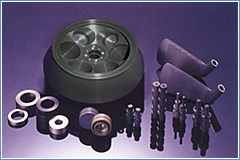

| 1 | 2 | 3 | 4 | 5 | 6 |
"We wish to provide satisfaction to our customers."
It is from this corporate value that our commitments naturally stem. These six distinctive commitments sum up the true essence of Denkahimakukougyou.
 |
Hard and Durable |
 Chrome plating is generally classified into decorative chrome plating and industrial chrome plating, or hard chrome plating. By the Japan Industry Standard (JIS), chrome applied by hard chrome plating is over 700HV.
Chrome plating is generally classified into decorative chrome plating and industrial chrome plating, or hard chrome plating. By the Japan Industry Standard (JIS), chrome applied by hard chrome plating is over 700HV.
Denkahimakukougyou specializes in hard chrome plating, and chrome applied at our factory is ultra hard (over 100HV by JIS definition) thanks to our unique technology called hard chrome carbide plating (Cr-C4), which uses organic substances to make chrome harder. This technology providing coatings with improved abrasion and corrosion resistance as well as high plate adhesion is widely used in mold manufacturing in many industries, including the semiconductor industry. It is also capable of masking wear and tear or defects, repairing metal articles by applying a thick (100 - 300μm) layer of chrome and regrinding it to produce a clean surface. The chrome we manufacture is quite uniform, requiring much less time to polish.
Flash plating is a technology applied particularly to high precision components to form a very thin and strong coating (1-3μm).
*Our technology is applied to production of semiconductor plastic encapsulation molds because the chrome (Cr-F) is so durable, making it easily removed from molds.
Denkahimakukougyou uses several types of plating solutions to apply hard coating over all kinds of aluminum alloy materials. The hardness of the chrome on a metal depends on the types base materials.
We do not seal alumite after plating unless specifically requested by a customer. This policy is based on the JIS standard shown below.
JIS H8603 Hard anodic oxide coatings on aluminum and its alloys (P. 914)
3. Definitions
A)Hard anodic oxide coatings on articles of aluminum are produced in a low-temperature electrolytic plating bath or a special electrolytic plating bath with a plating liquid comprised of several types of organic acid. They are harder than coatings produced in other conventional plating methods and of higher resistance to ablation. Sealing of anodic oxide is not a part of the normal process, and is applied when corrosion resistance is required, but also decreases resistance to ablation of the coating.
Without sealing, porous anodic oxide coatings are produced, which leave the surface slightly sticky. Sealing is therefore recommended for articles that will be handled by users. We perform sealing upon customer request.
| 1 | 2 | 3 | 4 | 5 | 6 |